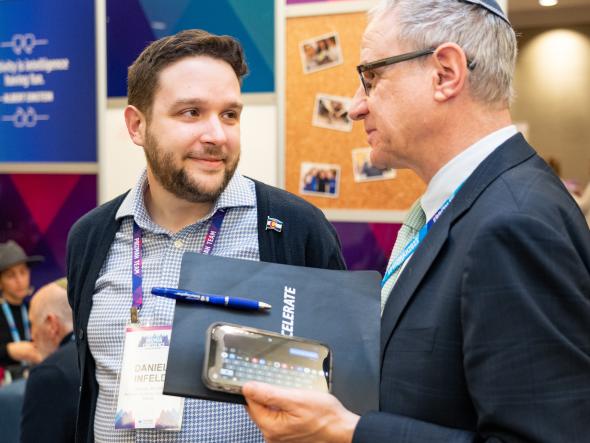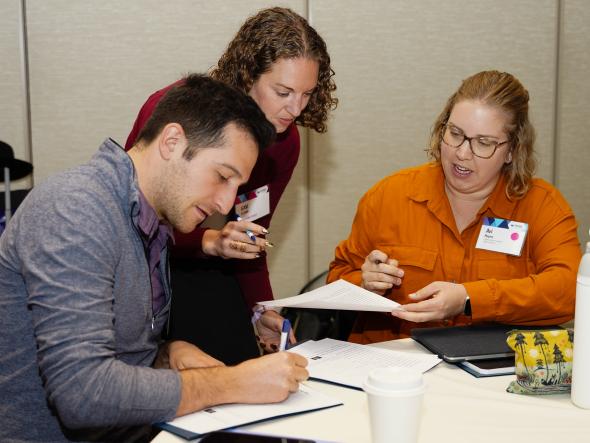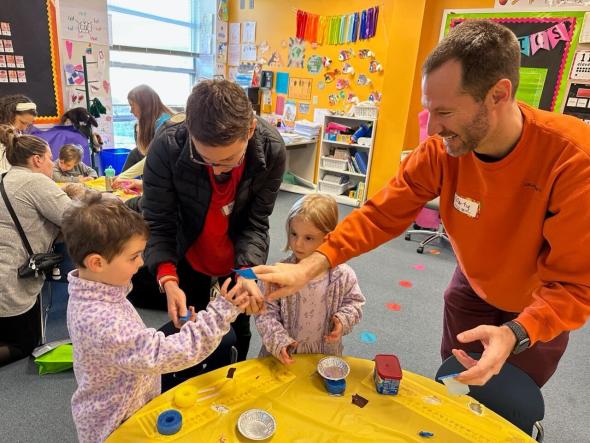Professional Learning
Daniel Infeld, Director, Conference and Gatherings
Daniel Infeld, Director, Conference and Gatherings

A particular interaction caught me off guard at the Prizmah Conference in January, and it was especially surprising because it occurred over and over again. I’d be standing in the hallway to give directions, waiting for an elevator with a group of participants, or walking around the Conference Hub, and a participant would glance at my nametag and delightedly exclaim, “You’re Daniel Infeld! You sent me all of the emails!” By the eighth or ninth time someone said this to me, I started to think about the structures and practices we employ at Prizmah to center relationships in our gatherings, to create a culture where people are excited to connect and share.
One such structure is those emails that participants were so excited to thank me for. We know that a gathering starts long before you show up to participate; the culture of a gathering starts to be built the moment someone accepts an invitation. So it was critically important that every conference email you received was personalized for you with a greeting that included your first name, and the email was sent from a real person (me) instead of a generic conference@ or info@ email address. We wanted you to know that you and your participation matter, because the conference was designed with your needs and your development as a school leader at the center. Through this intentionality, we hoped to begin to build a human connection between participants and Prizmah, both to help you to feel that the Prizmah team is here for you and ready to meet your needs, and to begin to ferment a culture that values personal connection.
The other important structure that fostered my connection with participants at the conference was my nametag. At conferences, these badges can serve many purposes, such as security credentials or as an opportunity to advance the branding of the host or promote sponsors. However, at Prizmah, we ask participants to wear name badges primarily for the purpose of cultivating a culture of connection, and we design them with that intention.
You may have noticed that the most important information on the badge—the participant’s name—has the largest font size possible. Names should be large and bold enough that they are clearly legible from 8-10 feet away, both for accessibility purposes and to avoid the awkward head check when the person you are speaking with glances down and squints to read your name on the badge. We also like to include additional information on badges, such as where someone comes from and what school or organization they work for. This helps participants strike up conversations or jog their memories when they can’t quite recall where they know someone from. These considerations present a real design challenge, both because the space on the badge is limited, and because participant and school/organization names vary significantly in length. We drove our designer and badge vendor a little crazy with the number of revisions and even physical mockups we printed, but it was all in service of building a culture where relationships matter and scaffolding relational learning for our participants.
These are just two relatively small examples of how we design an experience to center connection and relationships. Join any Prizmah gathering, either online or in-person, and we hope that you will see and feel that building relationships is at the core of what we do. You might experience a session designed for you to engage in content with your peers, or you chat in the hotel bar late at night with old friends. You could be assigned to a meal table or a Zoom breakout room with other leaders who share your interests, or you could find yourself in a one-on-one conversation with someone who can help you untangle your latest challenge.
This is all because we believe that gatherings should not be islands in time. What happens in the moment is important, but even more important is what happens as a result of the gathering—the new ideas you implement when you return to your school, and the people upon whom you can call to strategize and celebrate together.
Gavi Elkind, Director, Leadership Development, and Ilisa Cappell, Senior Vice President, Engagement and Leadership

“Leadership is rooted in connection. Effective leaders build trust and enable people to learn from one another so they can adapt and respond to their environment together.”
This is one of three central ideas about leadership that anchor, guide and inform YOU Lead, Prizmah’s signature leadership development program for Jewish day school leaders. We know that relationships are at the heart of inspiring and effective leadership, and so they form the foundation of YOU Lead. Within the program, we focus on building and nurturing lasting, authentic relationships in the following ways.
Every YOU Lead participant is matched with a mentor, and the leader and mentor engage in biweekly coaching together throughout the program. Mentors approach their relationship with YOU Leaders with a mindset derived from the Co-Active Coaching Model, which centers on the transformational change that individuals can evoke in themselves through experiential learning, connection and self-awareness. Through their coaching work together, YOU Leaders and their mentors develop trusting, lasting relationships that inspire reflection, growth and change.
Lorne Grintuch (YOU Lead ’23) shared about his experience with a YOU Lead mentor: “YOU Lead has provided me with an opportunity to receive guidance from an accomplished and intuitive mentor. Our focus is consistently on individual professional growth for the purpose of strengthening Jewish education as a whole.”
YOU Leaders are divided into three cohorts of roughly 10-12, with participants who share similar scopes of decision-making responsibilities in their work. In addition to meeting in person at the start of the YOU Lead program and building relationships with one another through asynchronous discussions, the cohorts meet monthly to explore a dilemma of practice, following a consultancy protocol. Through these regular points of connection, YOU Leaders build deep trust with one another, expand their thinking about how to approach challenges in their school communities and cultivate lasting relationships with professionals from all over North America.
Amira Soleimani (YOU Lead ’23) reflected on her experience in her YOU Lead cohort: “My YOU Lead cohort is the professional community I never knew I needed. There was an instant bond that formed in my cohort, strengthened by our desire to learn collaboratively, support each other and nurture each individual’s growth. Together, we experience and model critically important leadership skills, such as empathy, presence and problem-solving—all while remaining deeply rooted in our Jewish foundation and values.”
Through YOU Lead, participants reflect on their relationship with their unique school community and the various stakeholder groups with whom they engage. Units of study throughout the program help YOU Leaders broaden their perspective about, and develop critical skills in, navigating important aspects of school life, including school culture, team development, hiring and supervision, and difficult conversations. Through their learning, YOU Leaders develop a holistic understanding of the various relationship networks of their community in particular, and Jewish day schools more broadly.
Finally, at the heart of the YOU Lead program is a commitment to nurturing each leader’s relationship to self. We believe that effective leaders continuously strive to understand themselves, own their responsibility, and reflect on their own thoughts, feelings and behaviors in order to serve and lead others. YOU Lead prioritizes vulnerability and self-efficacy in our learning, and encourages leaders to cultivate practices for self-reflection that will persist throughout their leadership journey.
Faye Kohn (YOU Lead ’23) noted: “In this early experience of leadership, I have been bolstered and transformed; this has been invaluable to me and, by extension, to my school community.”
By anchoring the program in a commitment to relationship-building, YOU Lead equips Jewish day school leaders with the skills, self-knowledge, connections and awareness they need to effect meaningful change in their school communities.
Beth Rivkind, Director, Enrollment Growth

The first steps of a journey to explore a Jewish day school can be overwhelming and intimidating to new families, but it can be a life-changing and fulfilling process (or so we would like to hope), with many positive relationships built along the way.
Engage, Prizmah’s signature yearlong partnership program, positions Jewish day schools to create, foster and sustain relationships with new parents and their local Jewish community in a way many day schools have not tapped into yet: through the development of strong community partnerships and through centering the Jewish day school as the hub for Jewish communal engagement.
It all begins with relationships.
With the ultimate goal of increasing Jewish day school enrollment, Engage focuses efforts on fostering three critical relationships.
Imagine this: It’s a fall Sunday morning days before Sukkot, and dozens of families are attending a science program at school. As families fill out name tags, make their cups of coffee and grab a nosh, they are greeted by a day school parent who happily chats while personally guiding them to the hands-on STEM/Sukkot activities. While parents interact with their children, the admission professional, several teachers and older day school students walk around introducing themselves and offering help. The welcoming and warm atmosphere is rare and unexpected to a few, but already makes everyone feel at home.
The STEM director leads an interactive presentation, and afterwards, families are encouraged to move outdoors for playground time and a Sukkot-inspired snack. They leave with a treat and an invitation to return for an upcoming program in the weeks ahead. Several days later, the school admission professional reaches out to thank each family for attending and answer questions.
These new families, once intimidated by the thought of Jewish day school, are overwhelmed by the warm welcome, the attention to detail and most of all, the community. They see the wonderful potential of having their child immersed in a Jewish atmosphere in everyday learning.
For many of these families, this initial STEM/Sukkot program, developed in partnership with PJ Library, is the first time they had stepped foot into the Jewish day school. These families might attend preschool at a local temple or JCC, and for various reasons, they had not considered day school as the next step for their family. This fall morning Sukkot program offered families an opportunity to develop their relationship with the school and in turn, to pursue enrollment for their children.
As illustrated on that fall day, the Engage program offers day schools the opportunity to build relationships with a new pipeline of Jewish families. However, the program is unique in that there is a strong focus on establishing a collaborative relationship between the Jewish day school and their local PJ Library partner, which is a natural pipeline of young Jewish families who are eager to bring Judaism into their homes.
Through the partnership developed within the Engage program, the school admission professional and the local PJ Library professional develop a strategy plan for engagements, which aligns with the school’s defined enrollment goals. Together, they analyze data to deepen the understanding of growth opportunities and identify the school strengths to develop tailored programs for prospective families. With this plan, in partnership, they can implement new or expanded family engagement programs geared toward specific target segments that highlight the strengths of the day school.
These family engagements are thoughtfully planned to offer values-based programming that showcases the unique school offerings. In some cases, engagements are held at neutral locations like a zoo, museum or park as a low-barrier way to attract unaffiliated families who might be intimidated by an overall religious setting.
Very often, during an engagement, there are many opportunities for parent connection that promote the development of relationships. Built-in time enables families to meet and greet. Current families and student ambassadors offer firsthand experiences and testimonials to illustrate their own day school experience. Ultimately, the strong partnership between the local PJ library professional and the Jewish day school admissions team is crucial to the success of engagements and the overall recruitment strategy.
When day schools are positioned as hubs of Jewish communal life, they are simultaneously breaking barriers and building relationships with local families. Families are presented with opportunities to expand their involvement in their Jewish community. The “scariness” of the unknown fades away, and the joys of a warm and welcoming community can be appreciated.
Maximizing community partnerships provide an opportunity for day schools to increase enrollment and build stronger Jewish communities. The Engage program allows schools to partner with PJ Library and reach families who already have shown interest in Jewish life. The partnership empowers families to become more “engaged” in Jewish life and schools to expand the pipeline of future day school families.